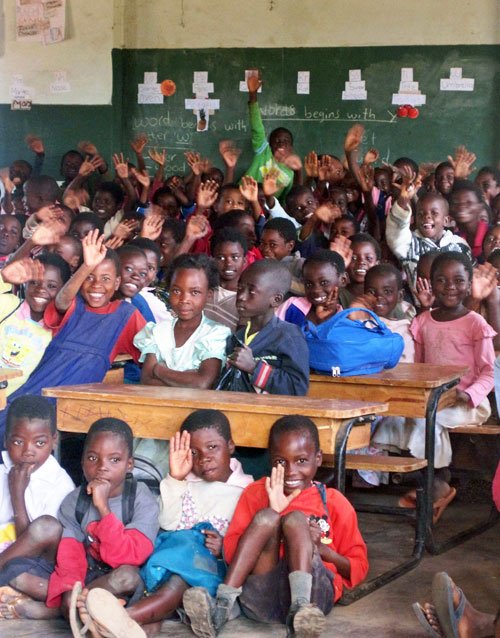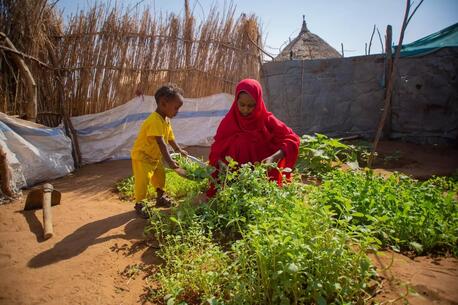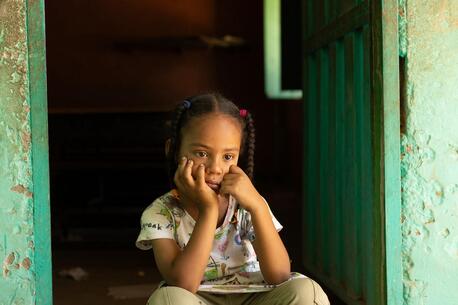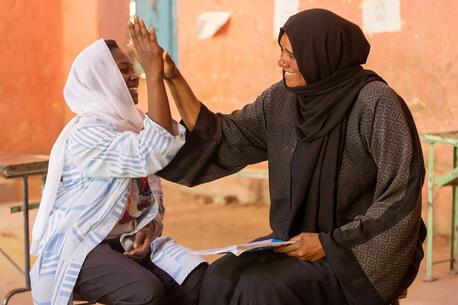Gucci and UNICEF: Something to smile about in Malawi
Frida Giannini is the Creative Director at Gucci. She joined UNICEF representatives on a field visit to Malawi, where in addition to Mozambique, the company's five-year long campaign supports UNICEF programs for thousands of orphans and children affected by HIV/AIDS.
As Creative Director at Gucci, I have seen first hand how our relationship with UNICEF has grown over the last five years. From the very first Holiday collection of accessories I designed in 2006 (which has since grown into a major global annual fundraising activity for our company) to huge ad campaigns and fundraising efforts with Rihanna and Madonna, respectively, our partnership has truly become an integral component to Gucci's company vision. I've always felt very proud of Gucci's commitment to giving back and of its impressive results--to date we've raised over $7 million for UNICEF. So you can imagine the very powerful experience I had when traveling to Malawi last November to see the people we have been helping for the first time.
After touching ground into Lilongwe airport and settling into our hotel, we began to make our way out into the rural regions that surround the city, led by UNICEF's on-the-ground local teams. The first thing that hit me was the adults--or shall I say, lack thereof. Indeed, there was a sea of children everywhere you looked. Tiny bodies with outstretched arms pleading to be picked up and held and noticed and loved.
I was shocked to learn that a whole generation of parents and grandparents is missing and that many children are living alone. Hundreds of thousands of children in Malawi have been orphaned by the HIV/AIDS pandemic.
Yet despite the dire situation and the impoverished conditions most of them were living in, I saw smiles everywhere. The children were running up to me, surrounding me, giving me high-fives, smiling and laughing. It was absolutely incredible. The joy in these kids' faces nearly broke my heart.
The first day when we went to Chimteka Community-based Child Care Center, I remember one girl in particular who climbed into my arms and refused to get down. I wanted to take her home with me. On the one hand you're thrilled to see the advances these places are making in terms of setting up education, recreation (there are swings and play things where there once were none), psychological support and nutrition (they were fed a plate of porridge which for some of these kids was their only meal of the day)--but at the same time, coming from where we do, sleeping on a comfortable bed with clean sheets and enough food, you can't help but think, "Is this enough? Am I really doing enough? Can't we do more?"
This was really the paradox I struggled with throughout my four day visit to Malawi. We visited a maternity hospital called Mchinji District Hospital where nearly 50 women all shared the same room, their family members sitting on the floor beside them. One woman in a separate room had a tiny premature baby strapped onto her stomach with blankets, as there were no incubators. But thanks to UNICEF's aid, the hospital is actually functioning and doctors are there managing both adult and pediatric HIV and AIDS care. Many villages are so far away from the hospitals, and many people, especially women, and children, cannot even reach them.
In one village we visited, the impact of HIV/AIDS became really clear when we met a family where the oldest member was a girl of thirteen or fourteen years old, and the smallest one was around two. And they were completely independent--with no water, no electricity, no beds to sleep in. Malawi has over 1 million orphans, and 550,000 of them are due to the HIV/AIDS pandemic. These families of orphans we met are benefiting from UNICEF programs for child-headed households, and the girls in this village were also somehow managing to smile and remain positive. You can read the news and see clips of these moments on television, but it's completely different when you are there on the ground, touching the hands of these children and looking into their eyes.
In another village, there were all these mango trees, and the children were coming down from this tree with all these fruits. And one of these children was in a corner, holding his mangoes in his t-shirt, guarding them. And he was looking at me really scared, very frightened. Then I started to play with him, and we did a running race together with the other children. He was the winner of the race and at the end I gave him a small piece of chocolate I had, and he gave me one of his mangoes. And I was so surprised by this very generous act, and happy when he finally started to smile at me. For me, this was one of the most touching moments of the trip.

We also visited several schools. Some that were not "child friendly"--meaning, no clean water, no meals, or no separate bathrooms for boys and girls. And then we saw the difference of "child friendly" schools, where each of these elements--which may seem trite and small but are actually key details that ensure kids continue to attend--were present. Thanks to Gucci funding of the Schools for Africa program, more and more of these child friendly schools are being built.
As the trip drew to a close, I began to see the situation much more clearly. The problems this country and these children face are enormous. We will never be able to radically change their existence from one day to the next. But slowly, with our continued support, more children will get fed, more will go to and stay in school, more will be helped in hospitals, more will lead better lives. I am extremely inspired by the work that UNICEF is doing and truly proud of what we are doing to support it. When you stop and think about trying to change the world, every little step, every little bit of help counts. Now that is really something to smile about.
Since 2005, the Gucci partnership with UNICEF has raised more than $7 million to support UNICEF programs that provide lifesaving health care, protection, clean water and education to orphans and vulnerable children in Malawi, Mozambique and South Africa, where more than 2.3 million children have lost one or both parents to HIV/AIDS. Visit Gucci.com to learn more about the campaign.


